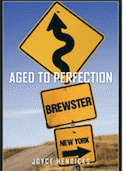My guest today is Joyce Henricks, author of Aged to Perfection. Welcome to OpEdNews, Joyce.
JB: You're a retired professor of philosophy and this is your first novel. Why did you write this book and why did you wait so long?
JH: Hi, Joan. Thank you for allowing me to talk about my book. Aged to Perfection, however, is my second book. The first one, Dying to Fit In, about a murder on campus, was written when I first retired. Once I got that out of my system, I found that I liked writing! After teaching philosophy, and writing for professional journals, it was a new, but rewarding, experience to try fiction writing.
I chose to write Aged to Perfection, about abuse in nursing homes, because I was familiar with my aunt's experience in one. I've always been interested in social issues, and care of the elderly was on my mind at the time since I was concerned about my aunt. But, I wanted to make it fun as well as informative. Remember, this is a work of fiction!
JB: I stand corrected. And I'd love to read your first novel. I love mysteries! In Aged to Perfection, both Hannah, the major character, and her friend are transplanted New Yorkers, plopped down in the Midwest. Why did you choose outsiders to move forward your plot?
JH: I wanted to show the differences - and similarities - between generations and, to a certain extent, between different socio-economic situations. Hannah, the main character, comes from a working class Jewish background; her friend, Ruby, comes from an upper-class Jewish background. All they have in common is they are New York Jews living in a midwest small town. It also allowed me to use a sort of "outsider's" view of life in a small midwest town. For example, the silly question by Hannah about why there are dead trees in the backyard -- in March -- is a real question that my mother asked when she first visited me. She lived her whole life in New York City --Brooklyn -- and, I guess never noticed that trees shed their leaves in the winter and they come back in the spring. (There weren't many trees in the neighborhood she lived in.)
Also, Hannah's views on child raising, romantic relationships, and food are in contrast to those of her daughter and granddaughter, which allow for what I thought were interesting contrasts. It was easier for me to present a small town in the midwest through the eyes of someone from a large urban city, especially an old woman with strong views about "how things should be."
JB: And that you did. Hannah definitely has strong views and principles but she's also vibrant and very likeable. And she's really important to her divorced daughter and her grandchildren. Bringing three generations together under one roof can be challenging. While the family goes through the ups and downs of modern life, they seem to work well together. Is that a realistic view of multi-generational living or more of an outlier?
JH: Well, with so many young people returning home after college, or never leaving home because of the lack of a decent paying job, I would hope that at least two generations could get along under the same roof. But, I also know that that's very challenging--and three generations has got to be even more challenging. But it is possible. There was a two-year period in my life when my daughter and her husband, and her daughter, my 3-year old granddaughter, lived with me. It worked out fine, but then I had a big house and I adore my granddaughter! Having a little one around, without the main responsibility of caring for her, is one of the joys of being a grandmother! Unfortunately, not many people have the luxury of a big house, adequate finances, and get along with their family members. And when you add in a person, usually the grandparent, who needs special care, you can understand why many families resort to assisted living or nursing homes for them.
So, this is a rather long answer to your question: I'm not sure how realistic it is for three generations to live together under one roof today. (Though, remember, there was a time not so long ago when it used to be quite common.)
JB: Agreed. Let's move along to the less than optimal situation many of our seniors find themselves in today. What can you tell us about that, Joyce?
JH: There are seniors in all sorts of situations: some are healthy and can live independently; some have sufficient money to stay in their homes with home care; some have family who can take care of them; and so on. One of the most difficult decisions a family has to make is what to do with grandma and grandpa when they need help and the family can no longer take care of them. Assisted living, memory care, and rehab and nursing facilities are an attempt to answer this question. And that's fine - IF the facilities are affordable and provide quality care.
Unfortunately, that's not always what happens. Many people cannot afford quality care and are placed in facilities that, at best, provide minimum care. I wrote about a facility like this in order to raise the issue, but put it into a fictional context so that I could make a mystery out of it. (I don't have any experience of a nursing home that continues to use people's social security checks without notifying anyone that the person has died.)
JB: I'm glad you raised the issue. It's an important one. What kind of reception has your book gotten so far?
(Note: You can view every article as one long page if you sign up as an Advocate Member, or higher).







